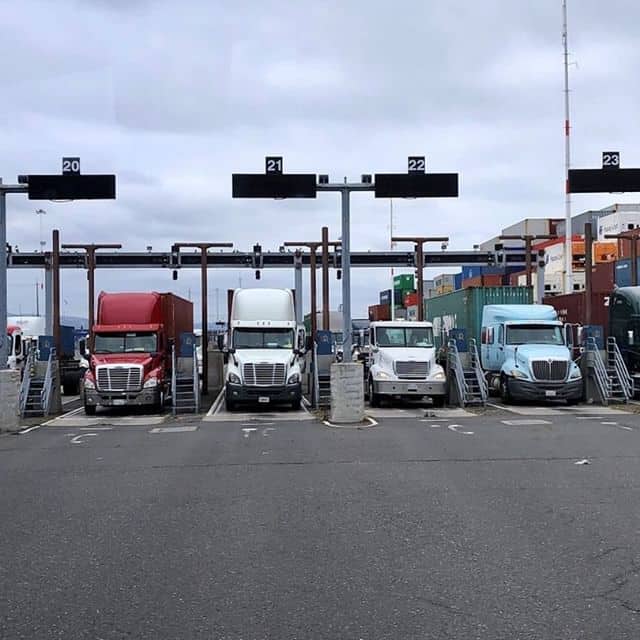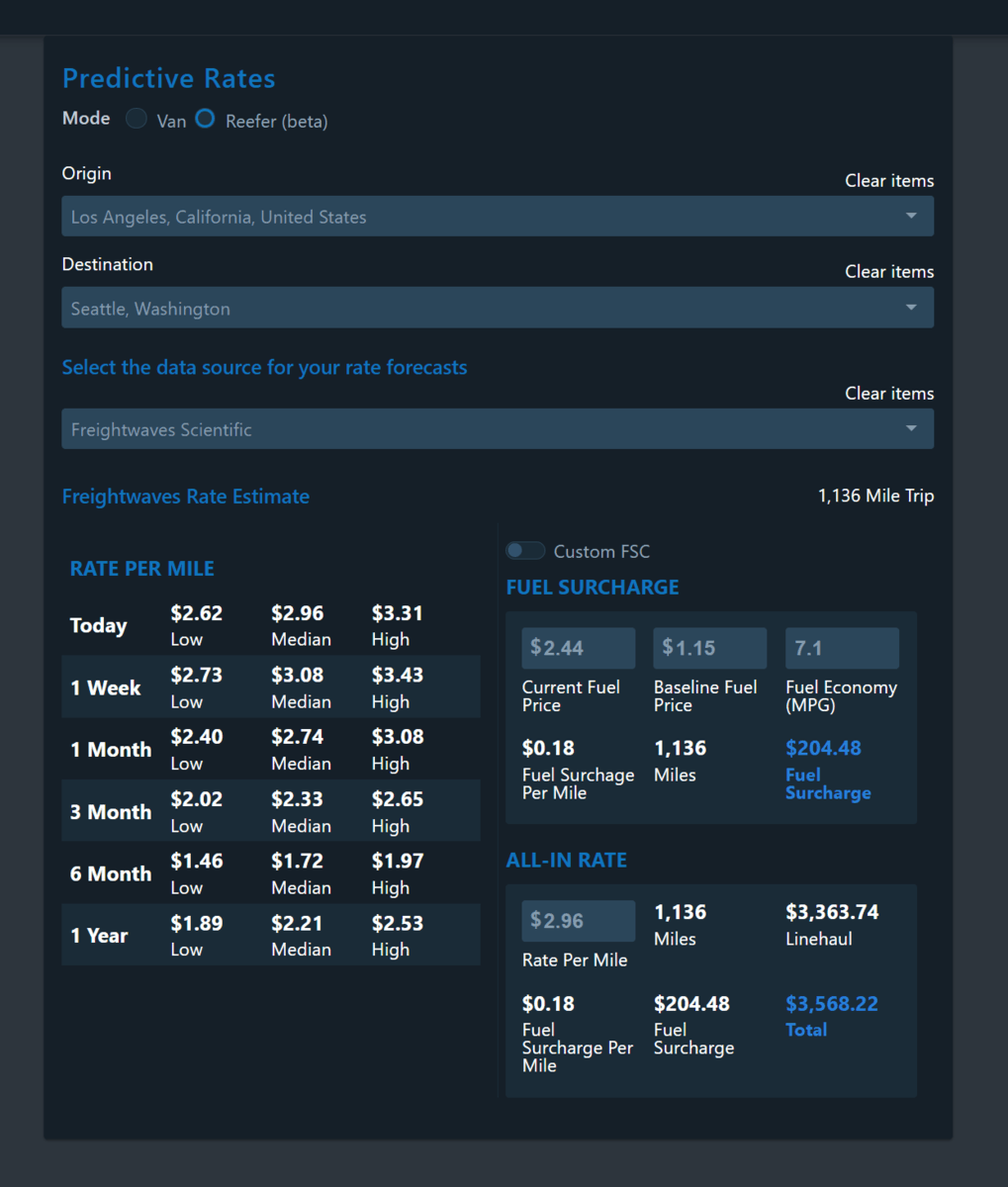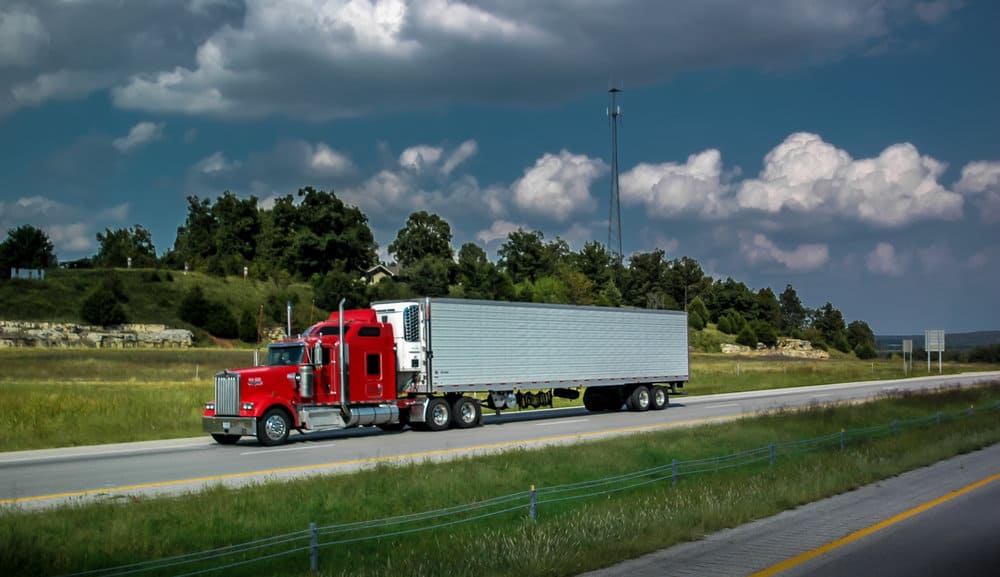The FreightWaves SONAR 7.0 release features several key enhancements; each makes the data and analytics platform even more useful to subscribers.
Lane Scorecard
The first is the Lane Scorecard app. “What makes Lane Scorecard unique from bulk lane rate tools on the market is its proprietary SONAR lane scoring, SONAR predictive rates and its spark graphs that allow the user to more easily see past and forecast trends,” announced Craig Fuller, FreightWaves founder and CEO.

(Photo: Port of Oakland)
“With Lane Scorecard, SONAR subscribers will save time because Lane Scorecard is organized and in the ‘right’ spot, will receive near-time market intelligence to improve pre-RFP strategy analysis and can identify new market opportunities with little to none native, historical data,” Fuller explained. Lane Scorecard is available to SONAR subscribers for an additional fee.
“Lane Scorecard is an app launched from SONAR’s main navigation panel,” Fuller added. “It can be enabled/permissioned at the organization or user level. For Lane Scorecard’s initial release we plan to show FreightWaves predictive rates – both forecast and historical.”

Lane Scorecard was developed in conjunction with SONAR clients and from client feedback. It will allow users to bulk upload lanes and get the following for each lane:
- Historical % change (spark chart)
- Predicted % change (spark chart)
- Distance (miles)
- Duration (hours)
- Equipment type (not yet available for reefer)
- Volatility risk score
- Lane score
- Origin SONAR Signal
- Destination SONAR Signal
- Current rate
- Predicted rate
Users will be able to select a time period for predictive rates from the drop down, and whether or not they want to see high, median or low rates. Before users upload anything, Lane Scorecard will default to the top 20 Truckstop.com lanes.
Users will upload a comma-separated values (CSV) file with the origin/destination pair zip codes (zip 5 or zip 3). There will be a template they can download on the upload window. Users will be able to upload 200 lanes at a time (to be expanded in the future). In addition, users will be able to download the results from Lane Scorecard to a CSV and open it in Excel.

(Photo: Jim Allen/FreightWaves)
In regard to Lane Scorecard’s use with requests for proposals (RFPs), it can identify and assign appropriate ‘risk premiums’ on traditionally volatile lanes. With Lane Scorecard, a user can create ‘ideal potential bid packages’ to leverage during mid-RFP round negotiations. In post-RFP execution planning, a user can report/benchmark the overall ‘attractiveness’ of a final award before signing off on an annual commitment. And, a user can appropriately allocate internal resources to secure dedicated capacity, based on a Lane Scorecard lane profile.
With the SONAR user interface, users can see lanes, market intelligence and rates. As a user interacts with the results table he/she can easily see the visualizations that provide additional insight that only SONAR does best.
Ocean Shipments Report
“I am also pleased to announce two other key additions to SONAR. The first is the Ocean Shipments Report, which shows U.S. import and export shipment volumes for ocean containers seven days into the future,” Fuller stated.

The Ocean Shipments Report is the best leading indicator available to gauge how much volume is being booked for U.S. imports. A SONAR subscriber will now have the ability to see exactly where ocean container volumes are being booked. SONAR is the only data platform in the world that has this data set. It will be located under the apps in SONAR and will provide subscribers new visualizations of maritime container flow and also give them the opportunity to plan for future trucking and/or intermodal activity at various U.S. ports.

(Photo: Jim Allen/FreightWaves)
Reefer Rates (beta)
“FreightWaves is also releasing Reefer Rates for beta testing,” Fuller announced. “Because this is a beta product, it will not be perfect, and our data scientists will fine-tune it as we get feedback from beta testers.”

Reefer Rates (Beta) will be available only on Predictive Rates while it is in beta testing. This new SONAR feature uses machine learning and algorithmic calculations similar to SONAR’s dry van rates, with a reefer premium. Reefer premiums are derived from historic ratios of reefer/van rates on lanes and the origin reefer volume market conditions.

(Photo: Jim Allen/FreightWaves)










